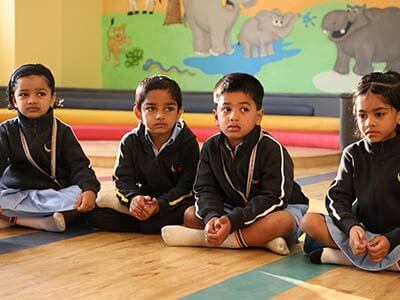Let’s accept it. Education is one of the most important milestones in a child’s life. And, as a parent, making sure that your little one begins on the right foot is paramount.
Yet, there are many doubts surrounding this stage. Among the many questions parents face, one of the most common is: What is the right age for Class 1 admission? That’s why we have prepared an in-depth blog on all you need to know about 1st standard admission age. Let’s check it out.
What is the Right Age for Class 1?
The CBSE board recommends that a child be 6 years old as of March 31 of the academic year to secure admission to Class 1. The Ministry of Education also takes the same view. Yet, this rule may slightly change as per school’s policies.
The Right Age For 1st Class
Well, the 1 class admission age is not just a number. It is set to make sure that children are developmentally ready for formal education. Starting too early or too late could impact their academic performance. Check out the reasons for setting 6 years as the age requirement:
Developmental Readiness
School readiness is a combination of physical and intellectual maturity. The age of 6 is when most children naturally reach these milestones. By this age, the children can form complete sentences and understand instructions clearly.
They even have the ability to adjust to new settings. It is only at this age that most children can handle a greater duration of time away from home. They can even begin doing very simple things like going to the restroom on their own or even managing their stuff.
Cultural and Social Factors
India places a lot of emphasis on education in the culture. Sometimes, this may lead to a rush to get children into school early. For instance:
- In urban environments, parents are often concerned that their children will fall behind if they start school any later than 4 or 5 years. Yet, early enrollment can backfire if the child isn’t ready developmentally.
- When it comes to rural settings, children may not start as early because of lack of money for school admissions.
Therefore, it is important to balance and consider a child’s readiness above the expectations of society.
Neurological Development
Neurological growth is one of the most compelling reasons to follow the accepted 1st standard admission age. At the age of 6, the brain’s neural networks are mature enough for well-structured learning to process. Problem-solving and analytical thinking begin to emerge to form the foundation of subjects like mathematics. Forcing a child into a rigorous academic environment too early can restrict these natural developmental processes.
Parental Expectations
In a country like India, parental aspirations often shape the educational path of their children. Ambition is great, but the expectations need to be balanced with the capability of the child.
If a child cannot cope up with academic demands, starting school early can bring undue pressure both to parents and to children. Only those with a well-prepared head are more likely to excel in academics and be positive toward learning.
Benefits of Adhering to CBSE Age Criteria for Class 1
Following the age eligibility for Class 1 admissions is not just for the sake of rules. It’s about setting your child off to the best possible beginning for their educational journey. Have a look at it’s benefits:
- Parents and teachers can focus on developing the child’s strengths rather than worrying about developmental gaps.
- Starting at 6 years of age ensures that students can build strong peer relationships. Being on par with them helps children build self-confidence.
- When children are of similar ages, they benefit from a standardized curriculum. None will have a feeling of being left out.
- By 6 years, children have the stamina and motor skills needed to manage school routines.
- Children who meet the age requirement are better prepared to grasp the CBSE curriculum. So, you can expect better academic results.
- When children are ready for school, they have more chances to enjoy learning and have a positive outlook toward education. This will build a strong foundation for the future years.
Age Criteria for Class 1 Admissions: Know Why It’s Crucial
Adherence to the age requirement creates a cohesive environment where everyone will be developed in the same plane within a class, hence inculcating a sense of oneness. Check out why it’s important:
- Curriculum Relevance: The CBSE board presumes that students of class 1 have developmental capabilities that are generally seen in 6-year-old children. Therefore, they designed the curriculum to meet that level of maturity. Age-appropriate enrollment ensures children can handle the learning material easily. They can also participate in activities that demand coordination like arts and crafts.
- Emotional and Social Adjustment: Entering at the right age allows students to develop robust relationships with their classmates and teachers. Thus, they are more likely to adapt to the school environment. On top of that, children will be more capable of managing emotions during transitions, such as moving from preschool to primary school.
- Teacher Preparedness: Most schools in Kalyani Nagar Pune train teachers to handle students of specific age groups. When children of 6 years enter class 1, they fit right into the teaching framework. So, the learning outcomes will be better.
Frequently Asked Questions (FAQs)
What is the minimum age requirement for Class 1 admission?
The minimum age is 6 years as of March 31 of the academic year.
Why is early education important for children?
Early learning builds a lifelong foundation for cognitive, emotional, and social growth during early development years.
What can parents do to enhance their child’s learning experience?
Parents can groom children at home to love reading and discover things around. Similarly, you must pick the best preschool Pune residents trust. All these will help the child embark upon a joyful and successful academic journey.
How does the right age influence a child’s extracurricular participation?
Children starting at the right age are more developmentally ready to explore extracurricular activities like sports, music, and art.
Conclusion
Just like adhering to the age requirements, picking the right school for your child is equally important. A good school can foster an environment where children are inspired to learn.
At Global Indian International School, we are committed to providing the best educational foundation for your child. We strictly follow CBSE guidelines to create a nurturing environment for your child. Get started now!






























